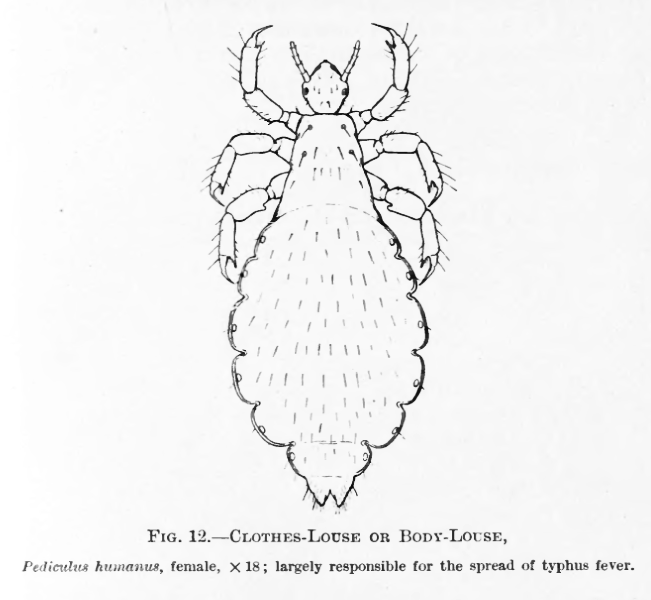- Body louse
image_width = 250px
regnum =Animal ia
phylum =Arthropod a
classis =Insect a
ordo =Phthiraptera
subordo =Anoplura
familia =Pediculidae
genus = "Pediculus"
species = "P. humanus"
binomial = "Pediculus humanus"
binomial_authority = L., 1758
trinomial = "Pediculus humanus humanus"
trinomial_authority = L., 1758The body louse ("Pediculus humanus humanus", sometimes called "Pediculus humanus corporis"cite book
last= Buxton
first= Patrick A.
title= The Louse; an account of the lice which infest man, their medical importance and control
origyear=1947
edition=2nd edition
publisher=Edward Arnold
location=London
pages=5-23
chapter=The Anatomy of "Pediculus humanus"] ) is alouse which infests humans. The condition of being infested withhead lice , body lice, orpubic lice is known aspediculosis .Origins
Genetic analysis suggests that the human body louse may have originated about 107,000 years ago from the head louse after the invention of clothing, with the ancestor of all human lice emerging about 770,000 years ago. [cite journal|author=Ralf Kittler, Manfred Kayser and Mark Stoneking|journal=Current Biology|volume=13|pages=1414–1417|year=2003doi=10.1016/S0960-9822(03)00507-4|title=Molecular Evolution of Pediculus humanus and the Origin of Clothing|url=http://www.eva.mpg.de/genetics/pdf/Kittler.CurBiol.2003.pdf|format=PDF|doi=10.1016/S0960-9822(03)00507-4|title=Molecular Evolution of Pediculus humanus and the Origin of Clothing|url=http://www.eva.mpg.de/genetics/pdf/Kittler.CurBiol.2003.pdf|format=PDF] cite web |url= http://www.current-biology.com/content/article/fulltext?uid=PIIS0960982204009856|last= Stoneking|first= Mark|title= Erratum: Molecular Evolution of "Pediculus humanus" and the Origin of Clothing|accessdate=2008-03-24 |format= |work= ]
Entomology and pathology
"Pediculus humanus humanus" (the body louse) is indistinguishable in appearance from "Pediculus humanus capitis" (the
head louse ) and under laboratory conditions they will interbreed. In their natural state, however, the two subspecies do not interbreed and occupy different habitats. In particular, body lice have evolved to attach their eggs to clothes, whereas head lice attach their eggs to the base of hairs.Body lice are a nuisance in themselves and cause intense itching. They are however, also vectors (transmitters) of other diseases such as
epidemic typhus and louse-bornerelapsing fever .Treatment
Delousing can be practically achieved by boiling all clothes and bed clothes.cite journal | author=Raoult D, Roux V | title=The body louse as a vector of reemerging human diseases | journal=Clin Infect Dis | year=1999 | volume=29 | pages=888–911 | doi=10.1086/520454 ] In fact, a temperature of 130° F or 55° C for 5 minutes will kill most of the adults and prevent eggs from hatching. [http://www.cigna.com/healthinfo/hw51114.html Page] on website of
CIGNA ] Where this is not practical or possible, powder dusting with 10%DDT , 1%malathion or 1%permethrin is also effective. Ifinsecticide is not available, louse-infested clothes and bedding should be burnt on an open fire.Medication is usually not necessary, as the problem normally goes away with daily bathing and wearing of clean clothes.
Oral
ivermectin at a dose of 12mg on days 0, 7 and 14 has been used in a small trial of 33 people inMarseilles , but did not result in complete eradication, although there was a significant fall in the number of parasites and proportion of people infected. [cite journal | author=Foucault C, Ranque S, Badiaga S, "et al." | title=Oral ivermectin in the treatment of body lice | journal=J Infect Dis | volume=193 | issue=3 | pages=474–6 | doi=10.1086/499279 | year=2006 ] At the moment, ivermectin cannot be routinely recommended for the treatment of body lice.References
ee also
*
Pediculosis
*Nitpicking
*Head louse
*Crab (or pubic) louseExternal Links
* [http://creatures.ifas.ufl.edu/urban/human_lice.htm body and head lice] on the
UF / IFAS Featured Creatures Web site
Wikimedia Foundation. 2010.

